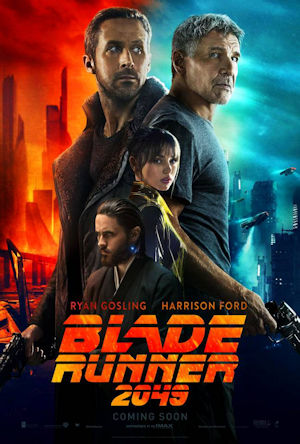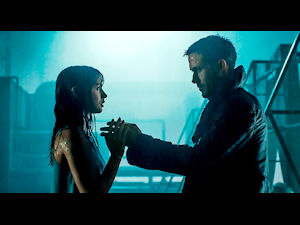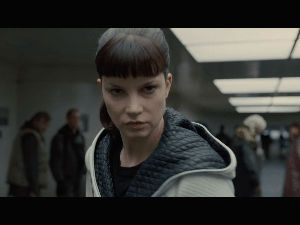Blade Runner 2049 - Movie Review (No Spoilers)
 | | Colorful |
Thirty years after the events of the original Blade Runner, there are still replicants in need of retiring and blade runners tasked with hunting them down. The last line of Tyrell's creations were built without the truncated lifespans of their predecessors but still plagued by the impulse to violently rise up against their human masters. After one particularly devastating uprising nearly wiped out the entire electronic infrastructure of the planet, they were finally banned from further development and production, until a new pioneer, Niander Wallace, figured out how to create more obedient versions. Now, with an apparent replicant Rennaissance well underway, one blade runner named K uncovers a secret that threatens to reignite chaos and change what it means to be human.
Denis Villeneuve's far-removed sequel to Ridley Scott's futuristic film noir masterpiece is a thoughtful, beautiful film that has managed to keep almost all of its secrets concealed prior to release. It continues to prove Villeneuve's credentials as one of the finest new directors on the scene (on the heels of Enemy, Sicario, and Arrival), and it provides the exceptionally talented Ryan Gosling with a mainstream movie role that caters to his strengths. Fans of Scott's classic film will not be disappointed, either, as Blade Runner 2049 threads the needle by seemlessly matching the atmosphere while expanding the universe, the narrative, and the ideas of its predecessor but also telling its own, unique story full of new and challenging concepts. It is a masterclass in how to craft not only a great sequel but also a great science-fiction film, and it's easily the best-looking bit of cinema so far this year. It most definitely does not deserve the underperforming box office numbers.
However, it is not a flawless picture, and there are obvious reasons why Blade Runner 2049 does not appeal to all audiences. First and foremost, this is--like 1982's Blade Runner--a slow, contemplative movie. Anyone familiar with the original and with Villeneuve shouldn't be even remotely surprised by this, but audiences who go in expecting a blockbuster full of big action set-pieces and a thrilling pace will certainly be disappointed, especially given the nearly three hour runtime. Personally, I love that the film harkens back to an earlier style of pacing and plotting, but I know my sensibilities are in the minority when it comes to big budget Hollywood productions.
This might be exacerbated at the start of the film by Ryan Gosling, whose character feels very similar at first to his nameless character in Nicholas Winding Refn's deeply divisive Drive. Anyone still traumatized by that movie's lack of action won't have nearly enough patience to see that K has a very different character arc from Driver, despite their nearly identical first impressions. As someone who has come around to Drive and will defend it (despite the fact that I absolutely hated it on first viewing), I can still say Blade Runner 2049 contains Gosling's single best performance to date, and it shouldn't really be compared to his role in Drive. As Blade Runner 2049 progresses and you see more and more of what makes his character tick, Gosling is flat-out incredible.
 | | Ryan Gosling and Ana de Armis are fantastic |
This is indicative of another potential sticking point for audiences: Blade Runner 2049 is far more interesting the deeper you dive into it, but on the surface, it appears more pretentious and shallow than it probably should. Patience goes a long way here, but with the movie being so long and methodical, there aren't enough audience members willing and able to sit through enough viewings to recoup the film's substantial budget. Fair or not, Blade Runner 2049 is destined to be like its namesake in yet another way: it will be a modest flop that develops a cult following.
There are plot elements that are very clever, but which might seem a little too convenient. After watching the movie for the first time, I left the theater a little disappointed because it seemed like the writing was just too neat in the end. However, after reflecting on it and giving small details more attention, almost all of the apparent conveniences vanished behind startling revelations about what is actually going on in this story. While I respect the film for being willing to keep such details a little obscure, it also paradoxically holds the audience's hand too much by having lines of dialogue from earlier scenes frequently and unnecessarily repeated. The film tries too hard to push you through the story by blatantly telling you what to think at critical moments, but in so doing, it takes away from the more subtle and interesting plot elements in the background.
On the positive side, though, there are a lot of intense philosophical themes being addressed throughout. Blade Runner 2049 takes the questions raised in the first film--about things like identity, consciousness, and empathy--and not only builds on them in intriguing ways, but also surpasses them with its own ideas. On a thematic level, there is so much going on here that I hardly know where to begin--so many layers to unwrap I don't know where to start tearing--but sufficed to say, there's enough to keep film analysts, professors, and students busy for at least a generation.
 | | Luv is meh |
Let's start with the character of Joi (played wonderfully by Ana de Armas), a fresh new addition to the story that has no proper analogue in the 1982 film. Joi is a holographic companion for K whose personality drips with compassion, emotion, and a genuine feeling of love for her owner. A few seemingly irrelevant lines of dialogue hint at the possibility that Joi is far less than she appears, which both subverts and expands on the expectations of a film series centered around the possibility that replicants are sentient beings who are, in every way that matters, human. Why does K seem to relate so much to her? Does she deserve the same philosophical attention as a replicant, or is she just a collection of cynical algorythms designed to exploit men's weaknesses and, ultimately, wallets, like a prostitute without a soul? There is one truly remarkable scene involving both Joi and a prostitute that is as fascinating as it is both unsettling and erotic, and it deals with all of these questions head-on.
Where I think the movie stumbles the hardest, though, is in its villains. The new corporate head of replicant manufacturing, Niander Wallace (Jared Leto, in what is not his best performance), isn't nearly as interesting as Eldon Tyrell, despite the film's overearnest attempts to make him seem deep and complicated. He also has no arc of his own, only appearing a handful of times to drive the plot with some overcooked dialogue and meaningless platitudes. Working on his behalf is the replicant Luv, who tries to get ahead of K throughout the movie, but her character is so cartoonishly evil that any potential ambiguity about her motives or intentions is stomped well out of existence. Sylvia Hooks, who plays the character, does a good job with the role and embues her with kick-ass flair, but no amount of acting can save what is a painfully one-dimensional and boring antagonist. What makes the replicants from the original Blade Runner so provocative--that their surface-level villainy masks relatable motives and the human condition--is lost on Luv, who never feels like more than just a bad robot.
Last but not least is Harrison Ford himself, Deckard, who doesn't appear until about halfway into the movie. His inclusion in the plot is surprisingly organic, though I do have some pertinent questions about how the plot device that leads K to him makes sense in the timeline of the story. Ford is quite good here, in a role that he could have easily phoned in. You can see how years of isolation have taken their toll on a man who was already fairly morose and isolated, and it's a much darker turn than, say, Han Solo in The Force Awakens.
 | | Oh, yeah, he's in this movie, too |
The music by Hans Zimmer isn't as memorable as Vangelis' (now terribly dated) score from the original, as Zimmer tries to riff off of Vangelis while still relying on the bass-filled blaring horns and dischordant melodies he's known for. It's not a bad score by any stretch, but it's an odd mix of styles that doesn't totally work in conjunction with the film. However, the sound design does work well to build tension at critical moments--there's a fight scene involving a loudly glitching-out holographic lounge show that is one of the most anxiety-inducing bits of celluloid I've ever seen, especially when the sound is being pumped through IMAX speakers--and the awe-inspiring sets and locations are epic enough on their own that they'd be impressive without any auditory accompaniment whatsoever.
Blade Runner 2049 is a breathtaking film full of big ideas, stunning images, brilliant effects, and a deep respect for its predecessor. Still, it's an impressive movie on its own merits, with a story that builds on the original without being beholden to it. Though there is a little bit of sequel bait to be found on the fringes of the story, this is a rare Hollywood blockbuster that isn't desperately trying to build a franchise or a connected universe. Villeneuve and Gosling are at the top of their game, and despite its few intermittent flaws and meandering sensibilities, fans of deep, thoughtful science-fiction should consider this absolutely mandatory viewing.
FINAL SCORE:





This is an impressive and intelligent science-fiction film that just happens to be a sequel to an equally impressive and intelligent science-fiction classic.
|
-e. magill 10/12/2017
|
|